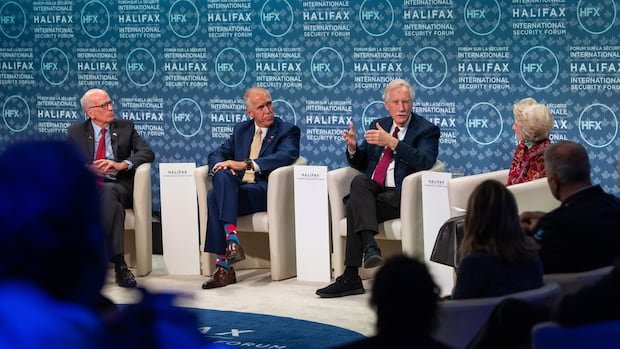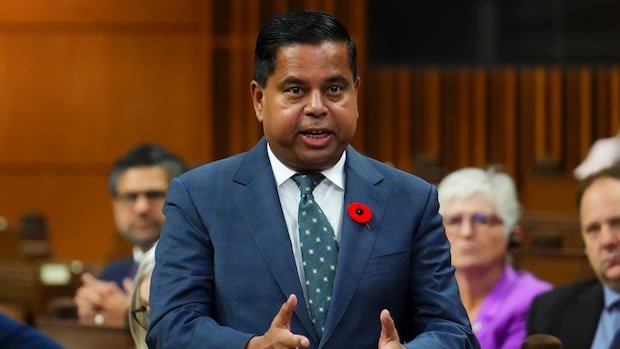Listen to this article
Dear 4 minutes
The audio version of this article is generated using text-to-speech, a technology based on artificial intelligence.
The tariffs imposed on Canada by US President Donald Trump have clearly caused Canada economic pain, but a US senator from Maine says he is more concerned about how Canadians are reacting on a personal level.
“Like any neighbour, there will always be back-and-forth issues, and we’ve been fighting over softwood lumber for as long as I can remember,” Angus King told an international safety conference in Halifax on Saturday.
“But the deeper problem is the cultural divide: the idea that Canadians don’t see Americans as their friends and neighbors, but as their adversaries.”
The annual Halifax International Security Forum that opened Friday has attracted more than 300 delegates from around the world, including politicians, academics, government officials, military leaders and non-governmental organizations.
The central theme of this year’s conference is democracy, but questions about Canada-U.S. relations sparked heated debate Saturday morning when King and three other American politicians were asked to talk about their country’s place in the world.
King, one of only two independents in the U.S. Senate, said the persistent gap between Canadians and Americans is particularly concerning in a state that borders New Brunswick and Quebec.
“Being from a state where we have people crossing the border to get their hair cut… it’s a sad day. And if it made any sense, that would be one thing. But there was no benefit to the United States imposing these ridiculous tariffs.”
In response, Republican Senator Thom Tillis reminded the audience that Canada and the United States are part of a broader family of democratic countries that have a long history of disputes over trade.
“I know that if we were threatened, we would help each other,” said the outspoken North Carolina senator.
But Tillis quickly pivoted to a harsh criticism of what he said was Canada’s failure to meet its financial obligations to NATO, saying Ottawa still owes the military alliance more than $300 billion.
“All the prime ministers have said the same thing: ‘We’re going to get it done,’ and they never got it done,” Tillis said.
“Some disparage the United States for its health care. On the other hand, we have fulfilled our obligations to fund our mutual defense for as long as NATO has existed.”
Former California congresswoman Jane Harman, a Democrat, argued that Canada recently committed to spending more on defense. In June, Prime Minister Mark Carney announced a plan to increase spending by $9 billion by March next year, raising defense spending to two per cent of Canada’s GDP.
Tillis scoffed at the promise. “That’s wonderful, but could we also make up for 20 years of underpayments?”
Republican Sen. Kevin Cramer, who represents North Dakota, said King was right to draw attention to the “cultural rift” between the two countries.
“It’s become a tension,” he said later during a news conference, adding that the tension has led to fewer Canadians traveling to the United States for pleasure.
“In North Dakota, that’s true of shopping at malls and staying at hotels. … Those numbers are down because people are angry.”
Senior political correspondent Rosemary Barton speaks with Democratic US Senator Jeanne Shaheen about trade tensions with Canada and her hopes for when negotiations will resume. Plus, Ontario’s representative in Washington, David Paterson, talks about what he’s hearing in his conversations in the U.S. and his reaction to the much-discussed exchange he had with U.S. Ambassador to Canada Pete Hoekstra.
Democratic Senator Jeanne Shaheen of New Hampshire told CBC rosemary barton live Restarting talks is in the benefit of both countries.
Shaheen said the tariffs have had a “difficult impact” on the Canadian and U.S. economies.
He said the biggest issue he hears from his constituents is the rising cost of living.
“The impact of tariffs on food prices, the impact on rents, on electricity prices and on child care,” Shaheen said.
“All the major expenses that families have to pay for have increased since Donald Trump took office. And tariffs are a big part of that.”
Kramer said he was hopeful something could be worked out despite Trump’s recent decision to impose more tariffs on Canadian companies.
“Our relationship with Canadians is very personal,” he said. “The best way to fix this is to get back to the negotiating table and fix whatever separates us on trade…People in both countries are eager to come together.”
MORE TOP STORIES










